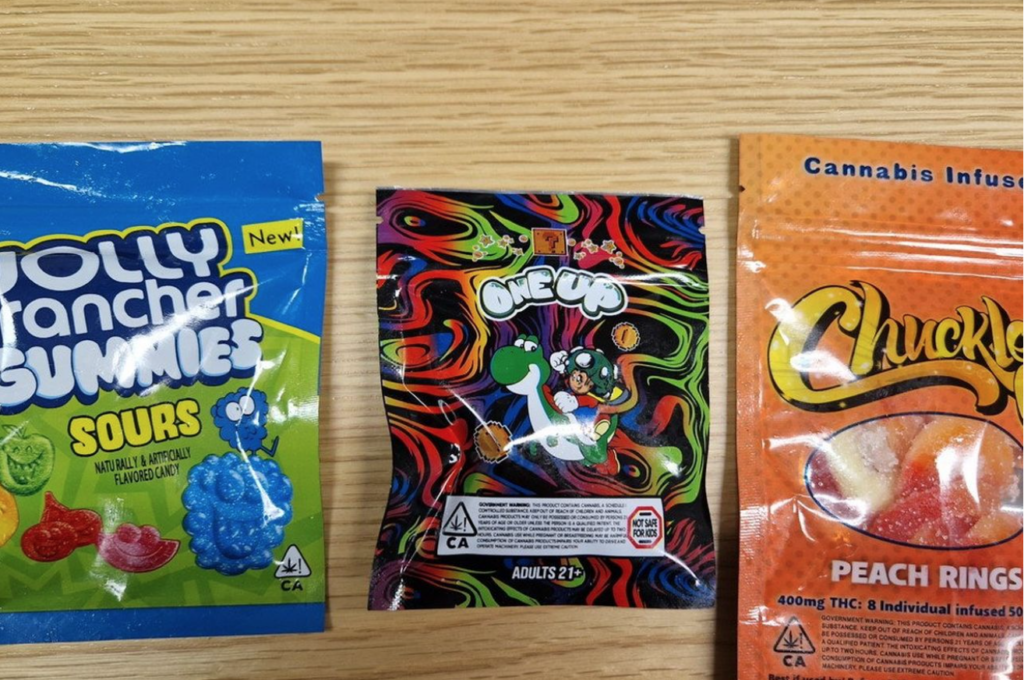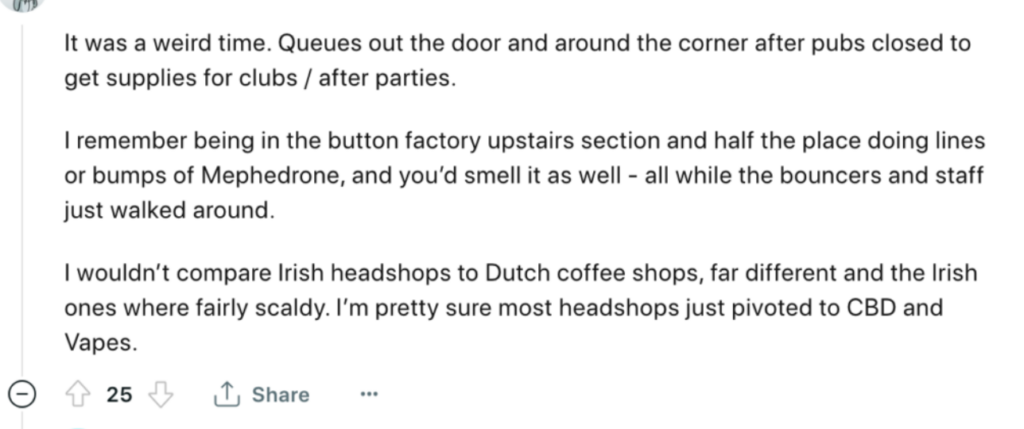We Need To Talk About Ireland’s ‘Fake Weed’ Problem
Words: Izzy Copestake
It may look like cannabis, smell like cannabis, or even be mixed into natural cannabis – but it’s made in a lab, and much more dangerous than the real thing. Synthetic cannabinoids are on the rise in Ireland again, but can the proposed decriminalisation of marijuana finally tackle the country’s synthetic drug problem?
As a seasoned weed-smoker, Ella* didn’t think knock-off cannabis could be that bad. Besides, how could something that’s sold on the high street, and tastes like an over-processed gummy sweet be worse than the very-obviously-illegal marijuana? “I had intense nausea, I was completely unable to speak, I was barely even able to recognise people. It was really unsettling.” Ella told District that the experience was more similar to an acid trip than smoking a joint, with intense after effects. “The following day, I still really struggled to speak properly.”

Ella, like many others who’ve had a bad run in with synthetic cannabinoids, cites the experience as one of the most unpleasant and intense drug encounters she’s ever had. But she didn’t need to slip cash into a dealer’s hands on a shadowy street corner to get it, she didn’t even have to take cash out. All she had to do was walk into a brightly lit vape shop just a short walk from Dublin’s city centre, tap her card, and eat a sticky, orange coloured gummy sweet, which was about the size of a Starburst.
“It’s easy to have an insanely strong response to the extent that people may suffer from serious medical complications … [and] a much greater potential for them to cause addiction.”
Guy Jones, Technical Lead at Reagent Tests UK and Senior Scientist at drug testing and harm reduction charity The Loop
But why is it so much worse than weed? Synthetic cannabinoids, known as ‘spice’, ‘K2’, or ‘synthetic marijuana’, are man-made chemical compounds that bind to the same part of the brain as the active molecules in cannabis do. But unlike natural marijuana, the chemical is easy to hide, unpredictable in strength, and can quickly become toxic if the user takes too much. Unlike natural cannabis, they can also be fatal in large quantities. Guy Jones, the Technical Lead at Reagent Tests UK and a Senior Scientist at drug testing and harm reduction charity The Loop, spoke to District about the dangers of the man-made drug. “With natural cannabinoids found in the cannabis plant, it’s very difficult to have any kind of overdose situation. With some of these synthetic cannabinoids, they bind so effectively to that part of the brain, and they come as a little white powder that’s super concentrated, that it’s easy to have an insanely strong response to the extent that people suffer from serious medical complications in the short term, then in the long term, there’s a great much greater potential for them to cause addiction. They are activating the receptors in a much more powerful way than the compounds in the cannabis plants can.”

In Ireland, the sale of synthetic cannabinoids has exploded in popularity in recent years. In 2022, over 50% of all “weed sweets” seized by the Garda didn’t contain any of the active ingredient found in natural marijuana, but synthetic cannabinoids instead. In the same year, three teenagers were hospitalised after consuming ‘Weed Jolly Ranchers’ they believed to contain THC, but instead, contained the more dangerous chemical synthetic cannabinoid ADB-PINACA. Sadly, even those buying natural weed aren’t safe. Last April, The Citizen’s Assembly on Drug Use heard that natural marijuana was increasingly being adulterated with synthetic cannabinoids.
These chemicals are in high circulation at the moment, but they’re still technically illegal. They’ve been illegal in Ireland since 2010, when the government introduced a bill which outlawed all products that had a psychoactive effect on the brain (other than caffeine and alcohol). Before this, man-made drugs like synthetic cannabinoids, mephedrone and bath salts could be bought legally at Ireland’s infamous head shops. “In 2009 the queue for Nirvana Head Shop was longer than the queue for the club next door”, says Craig Connolly, remembering Dublin in the height of its legal high era. “People would just come into the club and sit on the floor or spend the night looking for an afters, nobody would dance – they’d just be awake for days.” Drug related emergencies declined after the ban, but making drugs illegal doesn’t get rid of them, it just moves the market underground. This was evident 6 years after the ban, when the 2016 EU Drugs Market Report concluded that young people in Ireland were consuming more new psychoactive substances (mostly synthetic cannabinoids) than anyone else in Europe, with demand for the drug on an exponential rise.

Despite the intense negative effects of synthetic cannabinoids compared to regular weed, they’re just not shifting from the Irish market. According to Guy Jones, money plays a big role in this. ‘If you’re a competent chemist, you can kind of think: what if we would add this part onto this molecule? This is something that chemists or medicinal chemists will do as a part of legal drug design to make new pharmaceutical drugs that treat different conditions. And the same things can be done outside of a legal arena, in order to make new drugs for the back market. They see the price of cannabis, and they think we could make a compound that’s 10 times more doses per gram, and we could do that for half the price of growing a cannabis plant. They’ll do it – money is a big motivator for people.”
“They see the price of cannabis, and they think we could make a compound that’s 10 times more doses per gram, and we could do that for half the price of growing a cannabis plant.”
Guy Jones, Technical Lead at Reagent Tests UK and Senior Scientist at drug testing and harm reduction charity The Loop
It’s also become much easier to hide synthetic cannabinoids in ‘fake edibles’ following a vast increase in legal cannabis edible products from the US. “When you’ve got a highly processed food, it becomes way easier to surreptitiously hide a different chemical in it that might have similar effects, or at least enough overlap that people don’t realise. And so people may think that they are buying a cannabis derived product, when actually they’re buying something that has been made in a laboratory. The problem is that this is a black market, the products are not labelled well, and the strength varies massively. The packaging may be designed to be appealing to everybody and that includes children.”
“People may think that they are buying a cannabis derived product, when actually they’re buying something that has been made in a laboratory.”
Guy Jones, Technical Lead at Reagent Tests UK and Senior Scientist at drug testing and harm reduction charity The Loop
But the main reason synthetic cannabinoids are not going anywhere fast is obvious: drug laws. “Cannabis, as everybody is no doubt aware, is illegal” says Guy Jones. “It’s very easy to test for and detect. There are dedicated labs, that’s their bread and butter, detecting cannabis in people’s blood in the urine in their hair.” Synthetic cannabinoids are constantly being reinvented, and changed weekly. What’s more they can be odourless and easy to hide making them attractive to people who fear prosecution or whose job may be at risk from urine drug tests. “These novel chemicals are in some cases, so new, that the labs just don’t even know what to look for.”
Earlier this year, People Before Profit proposed a bill, in line with the recommendations of the Citizen’s Assembly on Drug Use, which would decriminalise cannabis. Experts have long cited measures like this as the only viable ways to curb demand and production of the more harmful and unpredictable synthetic substances which replace natural cannabis. The synthetic cannabinoid explosion in Ireland is part of a wider, archaic issue surrounding harm prevention. Consumers of drugs can never be sure what they are buying due to a lack of drug testing, allowing dealers to circulate synthetic, harmful substances – which turn the most profit.
District reached out to the HSE for a statement, to which they responded: ‘Unfortunately, we don’t have a spokesperson available at this time to speak to you on this issue.’
Reagent Testing kits can be ordered online and used to test the purity and adulteration of a substance
*name has been changed for privacy





